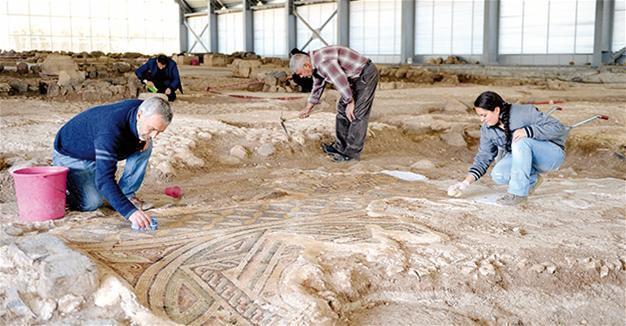Kilis mosaics to serve tourism
KİLİS – Anadolu Agency

AA photo
A basilica, which was unearthed 18 years ago during illegal excavations in the southeastern province of Kilis and is home to 1,600 year-old mosaics, is set to open to tourism.
Kilis Governor İsmail Çataklı said that in 1999, after an illegal excavation was carried out, archaeologists were called to conduct searches in Oylum Mound, who had revealed that the site carried mosaics and a basilica underneath.
The excavations revealed historic mosaics and tombs, which most of them were in good condition, and initiated works to prepare the field as a tourism site.
The field is set to be reorganized as an open-air museum for visitors by the beginning of summer.
Çataklı confirmed that the works that started in 1999 in the field of the Byzantine mosaics had been finished.
He said the tombs of religious figures were found on the basilica structure, adding that the basilica was designed as an open-air museum with a project and it was covered with steel roof.
Çataklı said works in the basilica field and different tombs were ongoing.
“In 1999, archaeologists were asked to come to this field after it was noticed that illegal excavations were carried out there. Then the ruins of mosaics were unearthed and further examinations showed that this place was a basilica. In the floor of the structure, there are 1,600-year-old mosaics dating back to the Byzantine era. They are made of local stones and they feature geometrical shapes. The mosaics in good condition were covered to prevent being damaged. The inscription of the structure, which was also uncovered during the excavations, is also under protection at the Gaziantep Museum right now. We will display it here in its original place when the work is done,” he said.
He added that the lighting in the field was finished and works were almost done.
The open-air museum, which is being established in the same field, is set to be finished in June, Çataklı said, adding that the museum would revive traditions of the era in various units.
The museum field will also have units like car parks and cafes to serve the needs of the visitors.
“We believe that this venue will become a frequent destination in Turkish tourism,” he added.
